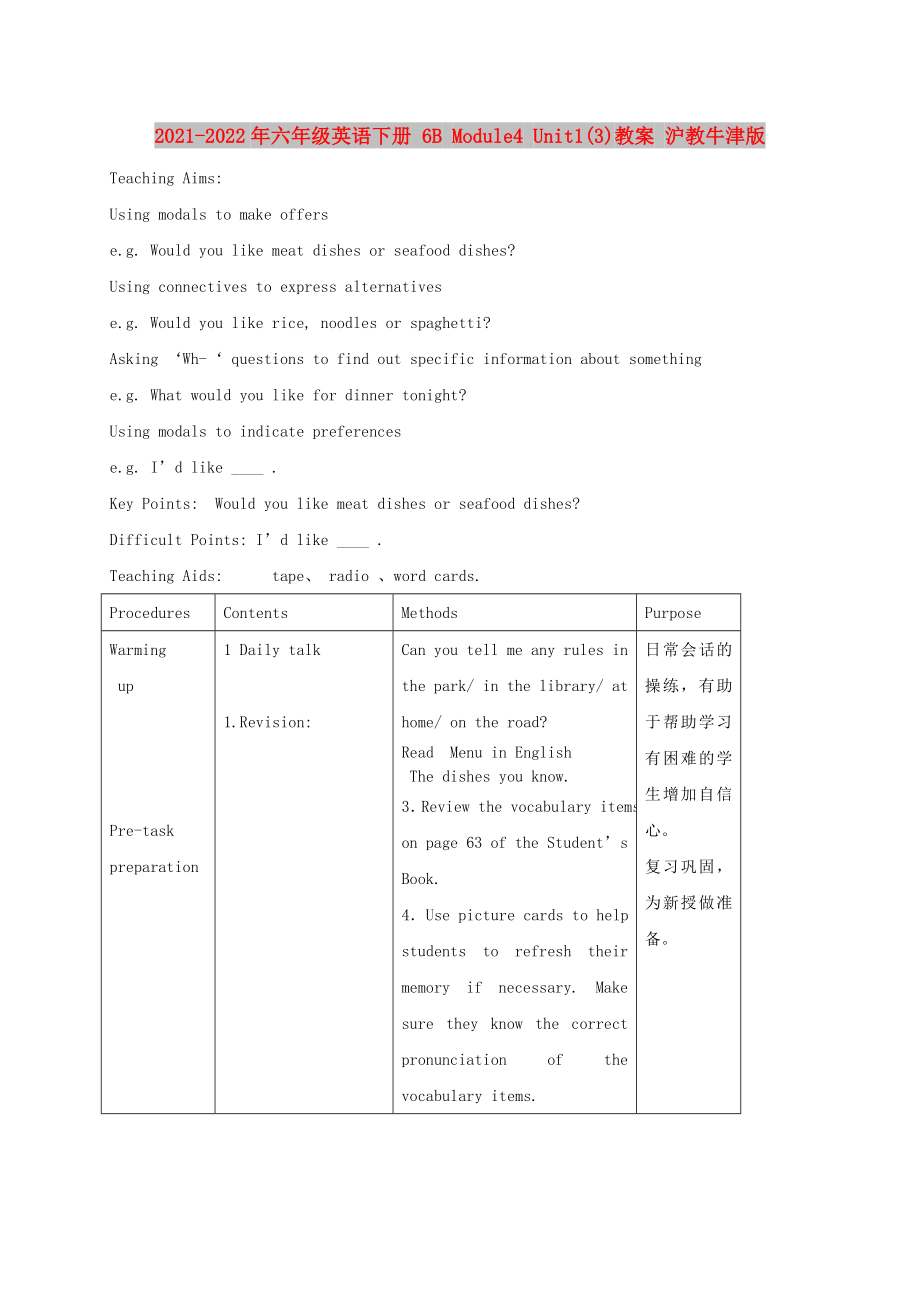《2021-2022年六年級英語下冊 6B Module4 Unit1(3)教案 滬教牛津版》由會員分享��,可在線閱讀��,更多相關(guān)《2021-2022年六年級英語下冊 6B Module4 Unit1(3)教案 滬教牛津版(5頁珍藏版)》請在裝配圖網(wǎng)上搜索���。
1��、2021-2022年六年級英語下冊 6B Module4 Unit1(3)教案 滬教牛津版
Teaching Aims:
Using modals to make offers
e.g. Would you like meat dishes or seafood dishes?
Using connectives to express alternatives
e.g. Would you like rice, noodles or spaghetti?
Asking ‘Wh-‘ questions to find out specific information about
2����、 something
e.g. What would you like for dinner tonight?
Using modals to indicate preferences
e.g. I’d like ____ .
Key Points: Would you like meat dishes or seafood dishes?
Difficult Points: I’d like ____ .
Teaching Aids: tape、 radio ��、word cards.
Procedures
Contents
3�����、
Methods
Purpose
Warming
up
Pre-task preparation
1 Daily talk
1.Revision:
Can you tell me any rules in the park/ in the library/ at home/ on the road?
Read Menu in English
The dishes you know.
3.Review the vocabulary items on page 63 of the Student’s Book.
4.Use pictur
4�、e cards to help students to refresh their memory if necessary. Make sure they know the correct pronunciation of the vocabulary items.
日常會話的操練,有助于幫助學(xué)習(xí)有困難的學(xué)生增加自信心���。
復(fù)習(xí)鞏固�����,為新授做準(zhǔn)備����。
While-task procedure
Post-task activities
Assignment
1.Photocopiable
5、 page 65
2.Photocopiable page 66
3.Act a scene
Exercises
Read and write.
1 Photocopiable page 65 choose one dish under each heading and write their own menus individually.
2 Photocopiable page 66. work in pairs to ask and answer each other’s questions abou
6���、t what his/her classmate wants to eat for dinner by choosing on food item under each category on page 63.
3 Invite some more able pairs to role-play a customer and a waiter in a restaurant setting.
Waiter: What would you like for dinner tonight?/What kind of vegetable dish would you like//Wha
7�����、t kind of meat dish or seafood dish would you like?/What kind of soup/dessert would you like?
Customer: I’d like _____ .
1.Photocopiable page 67
1. Look and say.
2 .Copy the new words.
3. Make a dialogue.
請學(xué)生發(fā)揮小組合作精神�����,盡可能快地掌握句型�����。
通過情境表演來進一步鞏固句型,并學(xué)以至用��。
附送:
2021-
8����、2022年六年級英語下冊 6B Module4 Unit1(4)教案 滬教牛津版
Teaching Aims:
Using the simple past tense to talk about past activities
e.g. Where did you buy them/it?
Asking ‘Wh-‘ questions to find out specific information about something
e.g. What would you like for dinner tonight?
Asking ‘How’ questions to fi
9、nd out prices
e.g. How much were they/was it?
Key Points: Where did you buy them/it?
Difficult Points: How much were they/was it?
Teaching Aids: tape����、 radio 、word cards.
Procedures
Contents
Methods
Purpose
Warming
up
Pre-task preparation
1 Daily talk
10、
1.Revision:
2. Look and say
What would you like for dinner tonight?
What kind of vegetable dish would you like?
1. Where do you usually go to do your shopping?
2 Different food items are put in different sections in a supermarket and people have to go to different stalls to buy dif
11���、ferent food items in a market. Introduce the names of the different sections and stalls
e.g. the vegetables/fruit/meat/ dairy products section
the fish/vegetable/fruit/frozen food/meat/grocery stall
3. Listen and repeat: Look and say
日常會話的操練�����,有助于幫助學(xué)習(xí)有困難的學(xué)生增加自信心�。
復(fù)習(xí)鞏固���,為新授做準(zhǔn)備�����。
12����、
While-task procedure
Post-task activities
Assignment
3.Act a scene
1.Photocopiable page 68
2.Exercises
Read and write.
4 Play a matching game: Match different sections/stalls and names of food items.
5 Read the d
13�����、ialogue in Look and say.
6 Role-play .
pay attention to the food items Mrs Li has bought, where she has bought them and their prices by referring them to Mrs Li’s shopping list and the pictures in Look and say.
1 Photocopiable page 68 Tell them that they are helping Mrs Li to find out the che
14���、aper food items and their prices.
2 Invite a representative from each group and tell the total amount Mrs Li has spent on her shopping.
3.Grammar Practice Book 6B page 52 and 53
1. Look and say.
2 .Copy the new words.
3. Go shopping with your mother and make a dialogue.
通過游戲��,新舊知識結(jié)合�,較好地掌握各sections 和stalls的食品。
通過情境表演來進一步鞏固句型�,并學(xué)以致用
聯(lián)系生活實際鞏固所學(xué)。
Notes
 2021-2022年六年級英語下冊 6B Module4 Unit1(3)教案 滬教牛津版
2021-2022年六年級英語下冊 6B Module4 Unit1(3)教案 滬教牛津版

